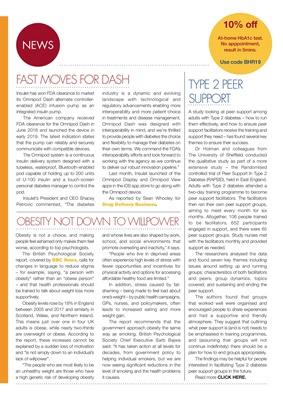
NEWS
FAST MOVES FOR DASH
Insulet has won FDA clearance to market
its Omnipod Dash alternate controllerenabled (ACE) infusion pump as an
integrated insulin pump.
The American company received
FDA clearance for the Omnipod Dash in
June 2018 and launched the device in
early 2019. The latest indication states
that the pump can reliably and securely
communicate with compatible devices.
The Omnipod system is a continuous
insulin delivery system designed with a
tubeless, waterproof, Bluetooth-enabled
pod capable of holding up to 200 units
of U-100 insulin and a touch-screen
personal diabetes manager to control the
pod.
Insulet's President and CEO Shacey
Petrovic commented, "The diabetes
10% off
At-home HbA1c test.
No apppointment,
result in 5mins.
Use code BHR19
TYPE 2 PEER
SUPPORT
Obesity is not a choice, and making
people feel ashamed only makes them feel
worse, according to top psychologists.
The British Psychological Society
report, covered by BBC News, calls for
changes in language to reduce stigma
- for example, saying, "a person with
obesity" rather than an "obese person"
- and that health professionals should
be trained to talk about weight loss more
supportively.
Obesity levels rose by 18% in England
between 2005 and 2017 and similarly in
Scotland, Wales, and Northern Ireland.
This means just over one in four UK
adults is obese, while nearly two-thirds
are overweight or obese. According to
the report, these increases cannot be
explained by a sudden loss of motivation
and "is not simply down to an individual's
lack of willpower".
"The people who are most likely to be
an unhealthy weight are those who have
a high genetic risk of developing obesity
OBESITY NOT DOWN TO WILLPOWER
industry is a dynamic and evolving
landscape with technological and
regulatory advancements enabling more
interoperability and more patient choice
in treatments and disease management.
Omnipod Dash was designed with
interoperability in mind, and we're thrilled
to provide people with diabetes the choice
and flexibility to manage their diabetes on
their own terms. We commend the FDA's
interoperability efforts and look forward to
working with the agency as we continue
to deliver our robust innovation pipeline."
Last month, Insulet launched of the
Omnipod Display and Omnipod View
apps in the iOS app store to go along with
the Omnipod device.
As reported by Sean Whooley for
Drug Delivery Business.
and whose lives are also shaped by work,
school, and social environments that
promote overeating and inactivity," it says.
"People who live in deprived areas
often experience high levels of stress with
fewer opportunities and incentives for
physical activity and options for accessing
affordable healthy food are limited."
In addition, stress caused by fatshaming -
being made to feel bad about
one's weight - by public health campaigns,
GPs, nurses, and policymakers, often
leads to increased eating and more
weight gain.
The report recommends that the
government approach obesity the same
way as smoking. British Psychological
Society Chief Executive Sarb Bajwa
said: "It has taken action at all levels for
decades, from government policy to
helping individual smokers, but we are
now seeing significant reductions in the
level of smoking and the health problems
it causes.
A study looking at peer support among
adults with Type 2 diabetes - how to run
them effectively, and how to ensure peer
support facilitators receive the training and
support they need - has found several key
themes to ensure their success.
Dr Holman and colleagues from
The University of Sheffield conducted
the qualitative study as part of a more
extensive study - the Randomised
controlled trial of Peer Support In Type 2
Diabetes (RAPSID), held in East England.
Adults with Type 2 diabetes attended a
two-day training programme to become
peer support facilitators. The facilitators
then ran their own peer support groups,
aiming to meet every month for six
months. Altogether, 106 people trained
to be facilitators, 652 participants
engaged in support, and there were 65
peer support groups. Study nurses met
with the facilitators monthly and provided
support as needed.
The researchers analysed the data
and found seven key themes including
issues around setting up and running
groups; characteristics of both facilitators
and peers; group dynamics, topics
covered; and sustaining and ending the
peer support.
The authors found that groups
that worked well were organised and
encouraged people to share experiences
and had a supportive and friendly
atmosphere. They suggest that outlining
what peer support is (and is not) needs to
be emphasised in training programmes,
and (assuming that groups will not
continue indefinitely) there should be a
plan for how to end groups appropriately.
The findings may be helpful for people
interested in facilitating Type 2 diabetes
peer support groups in the future.
Read more CLICK HERE.